After crafting $1.2 trillion infrastructure deal, bipartisan group of senators start lobbying White House, colleagues

WASHINGTON – A bipartisan group of moderate senators has reached a tentative deal on an eight-year, $1.2 trillion infrastructure package they hope could be a breakthrough between Republicans and President Joe Biden after weeks of gridlock.
The deal, reported by several media outlets and confirmed by a Senate source familiar with the deal, would focus on traditional transportation programs such as rail, bridges and waterways. It would not include “soft” infrastructure such as climate change and housing, which Biden had called for in his original $2.25 trillion American Jobs Act.
It would not increase the corporate tax rate, which Biden had proposed raising from 21% to 28%. And it doesn’t call for a hike in the 18.4-cent federal per-gallon gas tax although annual increases “indexed” to inflation could be included.
But it would include hundreds of billions in new revenue Biden has been asking for to address the nation’s crumbling bridges, aging waterways and inadequate broadband network.
Infrastructure talks: Where do infrastructure talks go from here now that Biden’s negotiations with Republicans collapsed?
Details beyond that had yet to be released Friday but backers are hopeful the deal could cross the finish line after several other attempts ran out of fuel.
“Our group – comprised of 10 Senators, 5 from each party – has worked in good faith and reached a bipartisan agreement on a realistic, compromise framework to modernize our nation’s infrastructure and energy technologies,” Sen Bill Cassidy, R-La., said in a statement on behalf of the group. “We are discussing our approach with our respective colleagues, and the White House, and remain optimistic that this can lay the groundwork to garner broad support from both parties and meet America’s infrastructure needs.”
Sens. Bill Cassidy, R-La., Kyrsten Sinema, D-Ariz., Lisa Murkowski, R-Alaska, and Mitt Romney, R-Utah, hold a bipartisan meeting on infrastructure in the basement of the U.S. Capitol building after original talks fell through with the White House on June 8. (Photo: Samuel Corum, Getty Images)
Aside from Cassidy, the group includes Democrats Joe Manchin (West Virginia), Jeanne Shaheen (New Hampshire), Kyrsten Sinema (Arizona), Jon Tester (Montana) and Mark Warner (Virginia); and Republicans Susan Collins (Maine), Lisa Murkowski (Alaska), Rob Portman (Ohio) and Mitt Romney (Utah).
Although it’s by far the largest infrastructure proposal that has some GOP backing, it’s expected to face blowback from progressives who want money spent on more than just roads, transit and airports. They want it to include schools, hospitals and housing while addressing climate change in a robust manner.
After Biden cut off negotiations with a group of Republicans led by Sen. Shelley Moore Capito of West Virginia on Tuesday, he turned to the bipartisan group of 10 senators.
The issue keeping both sides apart is how much “new money” to include to pay for the bill. New money could include tax increases, which Republicans oppose, or a drawdown of unspent COVID relief aid, which Biden opposes. In his latest offer, Biden proposed $1 trillion in new money over eight years while the bipartisan groups is proposing $579 in new spending. The details on where that money comes from has yet to be made paublic.
Sen. Bill Cassidy, R-La., questions Secretary of Health and Human Services Xavier Becerra on President Joe Biden's budget requests, at the Capitol in Washington, Thursday, June 10, 2021. Cassidy is working with a bipartisan group of 10 senators negotiating an infrastructure deal with President Joe Biden. (AP Photo/J. Scott Applewhite) ORG XMIT: DCSA135 (Photo: J. Scott Applewhite, AP)
The bipartisan group’s offer includes $597 billion in new money over five years.
If Biden doesn’t reach an agreement, Democrats could choose to push through an infrastructure package using budget reconciliation, a legislative maneuver subject to certain rules that would allow the bill to pass with only a simple majority in the evenly divided Senate. In essence, it would allow Democrats, who control the chamber by virtue of Vice President Kamala Harris’ ability to break ties, to pass a proposal without any Republican support.
Biden in Europe: 4 takeaways from Joe Biden’s first meeting with Boris Johnson
Senate Majority Leader Chuck Schumer, D-N.Y., said Senate Democrats are pursuing a “two-path proposal” that includes reconciliation.
He laid out a scenario in which Biden reaches a bipartisan deal on traditional infrastructure such as roads, bridges and broadband and Democrats try to pass another piece of legislation through reconciliation that would contain initiatives on which the two sides couldn’t come to an agreement.
Despite the bipartisan agreement, Romney urged caution.
“We have a tentative agreement … but that’s among the five Democrats and the five Republicans,” he told reporters Thursday. “It has not been taken to our respective caucuses or the White House. So we’re in the middle of the process. Not at the end of the process. Not at the beginning, but we’re in the middle…we’re talking to folks, one by one, and asking them to be open, not just sign on because they’re going to look at much more detail, a lot of paper, before people decide to sign this.”
The order will create a new process to determine whether apps controlled by foreign adversaries pose a security risk.
Video Elephant
Source: Read Full Article


